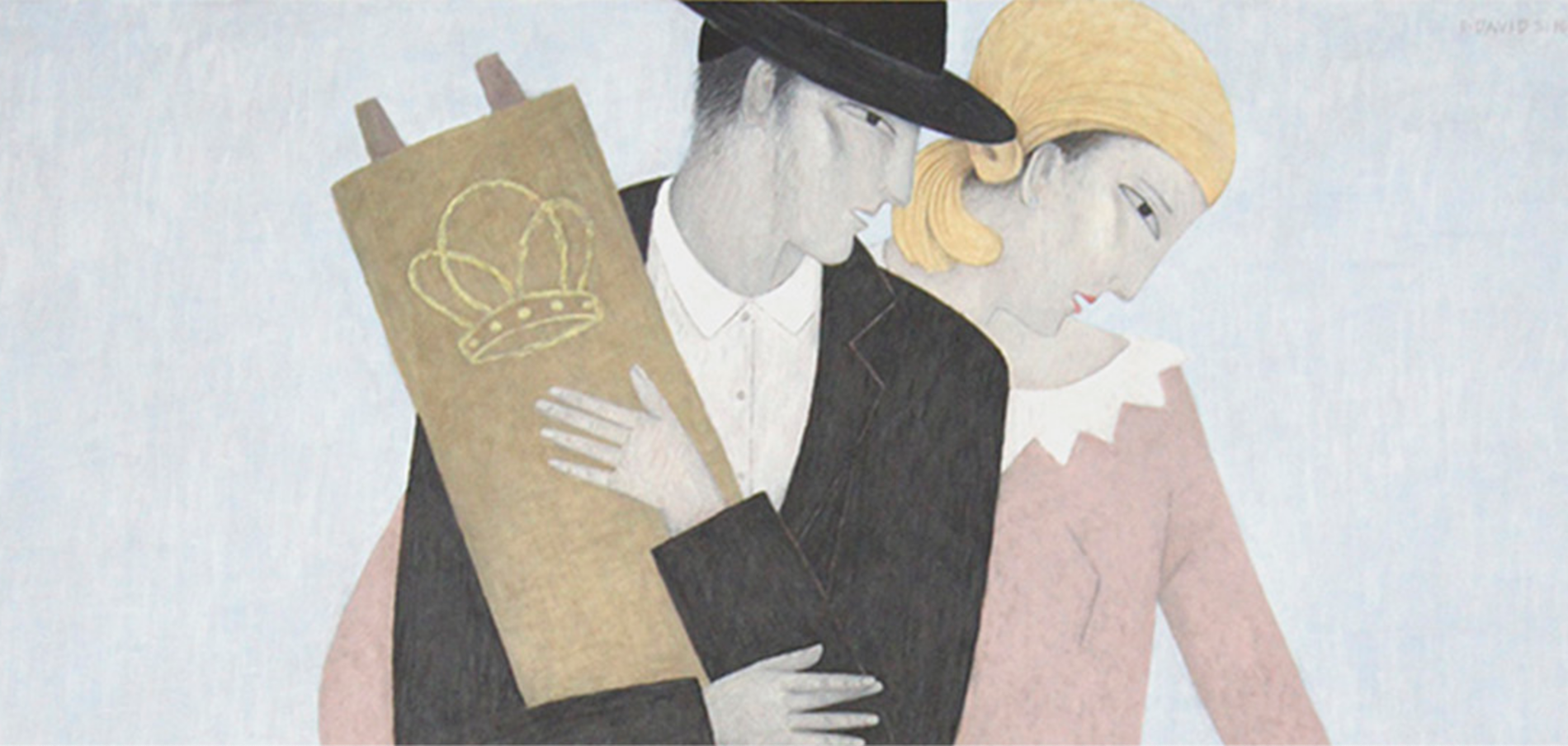
Why Do Orthodox Jewish Women Shave Their Heads?
Dear Jew in the City-
Why do Orthodox Jewish women shave their heads?
Thank you,
Kylie
Dear Kylie-
Thanks for your question. To say that Orthodox Jewish women shave their heads is a huge generalization, and not a particularly accurate one. What the majority of Orthodox women do is cover their hair.
The parameters of the laws of tzniyus (modesty) are not explicit in the Torah. They are part of the Torah she’b’al peh – our oral tradition, which was communicated teacher-to-student until finally being committed to writing in the Talmud. There are, however, allusions to the laws of tzniyus in the Torah.
Perhaps the best-known allusion to the law of women’s hair occurs in parshas Naso, in the section of the sotah (the suspected woman). Numbers 5:18 tells us that the kohein stands the suspected woman before Hashem and uncovers her hair; the Talmud in Kesubos (72a) observes that the Torah takes it for granted that a married woman’s hair is normally covered.
The parts of the body that are considered ervah (private because they are potentially sexually-attractive) are alluded to in Shir HaShirim (Song of Songs). This includes the hair, as per verse 4:1, “You are beautiful, my love, you are beautiful. Your eyes are like doves, your hair inside your kerchief is like a flock of goats that stream down from Mount Gilad” (Brachos 24a). Of course, the details of different types of ervah differ. For example, a woman’s singing voice is considered private in halacha but not her speaking voice. Similarly, uncovered hair is considered private for a married woman but not for a single woman. (It’s also not retroactive; married women don’t have to hide photos of themselves from before they were married.)
We see the concept of married women’s hair covering taken as a given throughout Talmudic literature:
- Ohn ben Peles was saved from being part of Korach’s rebellion by his wife. When Korach’s men came to fetch Ohn, she sat the entrance to their tent with her hair uncovered, causing the messengers to turn around and walk away (Sanhedrin 109b-110a);
- The Rabbis asked Kimchis what she had done to merit having seven sons serve as Kohein Gadol (High Priest). She responded that the beams of her house never saw her with her hair uncovered. While the Rabbis rejected her hypothesis (because many other women have acted likewise), the extent to which she observed this law is still presented as an example of meritorious behavior (Yoma 47a; see Yerushalmi Megilla 1:10 for the accepted opinion as to the merit of Kimchis);
- Rabbi Akiva once fined a man 400 zuz (an exorbitant sum) for uncovering a woman’s hair in public. The man subsequently demonstrated that the woman did not hesitate to uncover her own hair in public but Rabbi Akiva refused to reduce the fine saying that the woman’s willingness to uncover her own hair does not give the man license to do so (Baba Kama 8:6).
There are other examples I could cite but the point is clear: our Sages universally agree that a married woman covering her hair is part of the laws of tzniyus. But shaving hair off? That’s a practice observed in a few particular communities; it’s not a sweeping societal norm among Orthodox Jews in general.
According to some Hasidic authorities, the only way to ensure that a woman’s hair doesn’t eventually stray from under her hat/turban/scarf/kerchief/wig/etc. is not to have any. There’s also a concern that hair might create an interposition when using the mikva. Ostensibly, this practice is based upon a statement in the Zohar (parshas Naso) to the effect that the mikva should not see a woman’s hair.
The fact that there may be such a source is hardly a “slam-dunk” in favor of head-shaving for a variety of reasons. The Talmud in several places either implies or states explicitly that the practice of women is not to shave their heads. For example, Eiruvin 100b says that one of the “curses of Eve” is that women grow their hair long, while Nazir 28b says that a man can cancel his wife’s vow to shave her head if he finds it unattractive. Furthermore, the Shulchan Aruch expressly prohibits women from shaving their heads (YD 182:5). The Zohar, while important, is not a halachic work so ruling from when it contradicts the Talmud or works of halacha is not a simple thing, and Hasidic communities act differently in such a situation than non-Hasidic communities. So this matter goes beyond merely acting leniently vs. acting stringently. (There are also those authorities who say that that’s not even what that Zohar means.)
This is not even the practice of all Hasidic communities. There are some Hasidic sects where the leadership may consider it obligatory for their adherents, others where it may be an optional practice, and still others where it may be virtually unheard of.
So is head-shaving a thing? Yes, but chiefly among women who belong to communities that follow that understanding of the Zohar in this matter. The majority of Orthodox women do not shave their heads. Rather, they cover their hair in a variety of ways and to a variety of degrees.
For more information, see The Tzniyus Book by Rabbi Abramowitz, available on Amazon.
Sincerely,
Rabbi Jack Abramowitz
JITC Educational Correspondent
Follow Ask Rabbi Jack on YouTube
This article was sponsored by Exhilaread, a thrilling journey to literacy.
If you found this content meaningful and want to help further our mission through our Keter, Makom, and Tikun branches, please consider becoming a Change Maker today.








27 comments
Sort by
If Kimchis had 7 sons who each became a Kohen Gadol, does that mean she had 6 sons die in her lifetime? Or is there some way where each one became impure and another son had to take over as Kohen Gadol temporarily?
Yeah, I always wondered that, too.
The latter; one who substitutes for an incapacitated Kohein Gadol is also considered a Kohein Gadol. If the ones who had served had died, she wouldn’t have been asked about her merits!
The Zohar (parshas Naso) that Rabbi Jack cites doesn’t say anything about mikvah. What it says is that the beams of a woman’s house should not see her hair. This is the meritorious practice observed by Kimchis (and many other women of her time) mentioned in the Talmud.
This stringency is actually one of the strongest proofs that the Talmud and Zohar agree that a woman (even the most righteous woman) DOES have hair. If she doesn’t have any, what is she hiding from her beams?
The Zohar that Rabbi Jack wants is in parshas Acharei Mos. That one talks about shaving and mikvah, but not about the mikvah ‘seeing’ anything.
AJ, it’s the second. Otherwise, it wouldn’t be a zechus. Each son served as the Kohen Gadol at some point, but more than one person at a time could be qualified to serve as the Kohen Gadol should the “chief” Kohen Gadol be impure or otherwise indisposed. The position of “vice” Kohen Gadol is known as “s’gan kohen gadol.”
Let’s be honest it’s a very small minority that still practices the head shaving tradition. Most rabbis don’t believe in it. I’m chassidish and don’t practice that minhag as well as none of my friends do.
But, again — where does head-shaving come from? Certainly not the Torah. Right?
It is definitely not from the Torah. This is not Jewish law. It’s a custom that came later. There’s a debate as to why.
Just came across this post. My mother, Nechama bat Nissan, of blessed memory told me that the reason women from Eastern Europe shaved their heads was that during the pogroms the Russian soldiers would crash a Jewish wedding; kidnap the bride, and rape her. The woman would shave her head to be unattractive to the Russian beast.
The other point I’d like to make is that a woman’s hair is cited (somewhere,) as her crown. After she is married, the beauty of her hair is only available for her husband to see. This helps makes her seductive to him. I also have to say that I can’t imagine having an intimate relationship with a woman with a shaved head as I have referenced in the previous paragraph.
From what I’ve heard, this practice started in Europe generations ago, where Jewish women were targeted.(attacked/kidnapped) By having their head shaved under their head covering it made them less attractive for potential attackers. I’m not sure of the source of this information, though most of my father’s family, shave their heads.
If it is expected that married women are to cover their hair because it might be considered sexually attractive, then why would it be acceptable for a woman’s hair to remain uncovered prior to marriage? Would that not be tempting for others to see their hair? Also, are married women able to have their hair uncovered in the home, then?
Because women’s hair is not as erotic as private parts. It is sensual, not sexual.
I’m an American born Muslim woman and I see many similarities of Jews with Islam as there are a lot of intersections of all three monotheistic faiths. I do not believe in covering my hair, but if one were to look at Nativity sets that are displayed during Christmas and look at Christian nuns habits we will observe a modesty all three faiths have in common. I notice more people objecting to women that choose and I use that word loosely, to observe modesty than to object to women or men that show little in clothing modesty..it is very subjective anyway on what is considered modest. Also, it seems the people who take it upon themselves to enforce these rules are committing a greater sin of being cruel and punitive. Where is the mercy and love all religions preach?
Shouldn’t a married woman retain her “alluring” hair to continue to be alluring to her husband? Surely it’s the moral responsibility of men to suppress any lust for married women.
It SHOULD be the responsibility of adult males to BE able to control themselves but alas it seems popular in Jewish Life to make excuses pertaining to their weaknesses and inability to control themselves. I guess it shows it angers me. There are such double standards it causes me growl moments 😔
Thanks for your comment, Marilyn. To clarfiy – Jewish law DOES require men to control themselves. They’re supposed to control their eyes, their words and their thoughts. But we see the concept as a partnership – men and women are each meant to do their part to be appropriate.
Jehovahs Witnesses cover their head/hair if doing bible studies with a man or with a male present.
My five year old daughter caught a glimpse of the part in Unorthodox where Esty’s hair was shaved and she had a visceral reaction to it. She wondered why Esty’s hair all had to be shaved off? Couldn’t they just leave some on top for her? Interesting the unedited reactions and feelings of children.
Its a control thing. Just like many extreme religions, women basically are property to their husbands. This is also part of the mind washing of their new reality of being a wife/mother because now that is all they are on earth for.
I don’t think it’s a control thing for everyone. There are plenty of women who don’t mind shaving as this is there understanding of Jewish law. In places where there is coercion around shaving, that’s definitely a problem. Men have plenty of stringent commandments as well in the most insular circles.
I completely disagree. I CHOSE to “up my observance level game” all on my very own. I dress more modestly and never leave the house with my hair uncovered. My husband and kids are supportive of my “modern orthodox” observance level even though they do not share it. No one, but NO ONE forced this on me…I don’t shave my head but I would if I had the guts to. I just find my hair annoying.. 🙂
I hear you. It certainly feels that way no matter how often we are told it is not. I guess a lot of anger and confusion grew in me from being that 9 year old girl reading the line ‘ thank G_d we were born men not women’ in a prayer book. I have never forgotten it 🙁
I addressed this challenging prayer here https://jewinthecity.com/2018/11/how-i-deal-with-thank-you-for-not-making-me-a-woman-shelo-asani-isha-blessing/
Perhaps if one looks at it in the light of all the responsibilities a woman…a wife…a mother (the whole concept of conceiving, baring and raising the chikdren) has….the man is joyful in not having to be a woman. Be grateful to God how we are wonderfully made and to what responsibilities He has given us …if you want to say “role”…His perfect plan.
Thank you for such a thorough answer – sincerely appreciated!
What I don’t understand about the women that DO shave their hair off, I mean so they just stay bald hidden under a wrap all the time? Wouldn’t their husbands want to see their hair at intimate moments? How would having no hair be attractive to their husbands?
Thank you for this helpful post. I found the notion that most orthodox women shaved their heads always very disturbing, and am relieved to hear that is not the case. Covering ones hair is totally undersrandable, but shaving it all off your entire adult married life just sounds cruel and painful. Of course its someones right to do so, but I appreciate the clarity that it is not the practice of most!